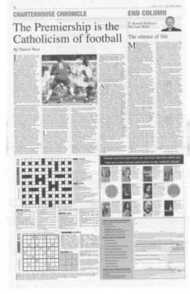Page 13, 31st August 2007
Page 13

Report an error
Noticed an error on this page?If you've noticed an error in this article please click here to report it.
Tags
Share
Related articles
Facts And Figures About The Popes From St. Peter To Pius Xii
For The Amnon Popes
Papal Token Of The Golden Rose
Benedicts Through The Ages
Anti-pope's Prayer Book On Offer
Extravagant exiles
This new book makes too much of the Avignon popes' lavish lifestyles, says John Greenhalgh
Avignon of the Popes: City of Exiles by Edwin Muffins, Signal Books 14.99
Avignon of the Popes remains a curiously unsatisfying (and unsatisfactory) account of one of the most fascinating periods of Christian history: the 14th-century. The Babylonian Exile of the papacy to Avignon is only a part of what those years brought in their wake, which included the ignoble suppression of the Templars, the final "crusade" against the Cathars, the arrival of the Black Death, the beginnings of the Hundred Years' War between England and France and a resurgence of anti-Semitism.
Beyond the political changes lay the architectural, artistic and literary genius of the likes of Jean de Louvres, Giovanetti, Dante and Petrarch, plus the birth of a new avant garde in music, which Mullins does not mention. Perhaps the problem is that Mullins tries to do too much in one book.
He describes it as "a portrait sketch" of seven popes, of a city, of a world enduring tumultuous changes, of sanctity and sybaritism. It is a mixture of different factors biography, history, sociology, theology and ecclesiology and travelogue.
It is not to be expected, necessarily, that a single author (even if heralded as an "acclaimed writer", "journalist" and "film maker") would write within each of these disciplines with the same authority and depth. and Mullins does not. The end product is that much of the text sounds somewhat glib and superficial.
The author is weakest on history. Avignon of the Popes cries out for footnotes and more attributions. A writer should not say. more than once, that "the papal court at Avignon under Clement VI is said to have cost 10 times that of the royal court in Paris." Said by whom? In what context? Or "An Italian who was present [at a reception for Pope Clement VI] left this detailed account of the event... 'The pope was led into a room hung from floor to ceiling with tapestries of a great richness... The meal consisted of nine courses, each containing three dishes..."' And so on. But who was the Italian? By what criteria should we be judging his description?
There is much unsubstantiated generalisation. Is it fair to say, for example, that there was a "medieval obsession with symbols"?
Again. there is inaccurate use of specialist language, as when Muffins uses "myth" to describe mere pretence.
Avignon of the Popes is also remarkably prejudicial, with an unsympathetic and too literal interpretation of events and personalities. Often, Mullins' portrayals of the popes lack depth. They are matched by an outrageous and anachronistic estimation of the Cathar perfecti whose function in society was "not as priests or moral tyrants but... to permit ordinary people to get on with their own sinful lives unburdened by guilt, confident in the knowledge that none of it was their fault, and without having to endure the tyranny of the weekly sermon and the weekly confession which the Catholic Church imposed upon them."
Weekly confession? In the 13th centtny? Surely not.
Muffins' bock is one long irony. generally lacking in humoutvvritten by someone standing back from the personalities and events of 14th-century Avignon, excert when decrying what is seen as inappropriate papal opulence. The hetoric is wayward. Statements such as "living like a king had meant behaving as if money descended directly from heaven by royal right" permeate the text.
The authorts at his best when taking the reader ona toar of the city or making sociological observations or producing v ignettes, such as "It is recorded that Clement VI even kept nightingales, though what is sot recorded is whether they could be persuaded to sag for him", but not when aining for historical perspective or informed theolgical statements.
And yet, it mains the kind of book that someone making a first isit to Avignon might horo• ughly benefit from: a curtainraiser, an easy nad, and a range of colourful personalities, not leastthe popes themselves, whose attributes and deficiencies are neatly surnmaried ty epithets such asCleirient the Magnificent
blog comments powered by Disqus

















